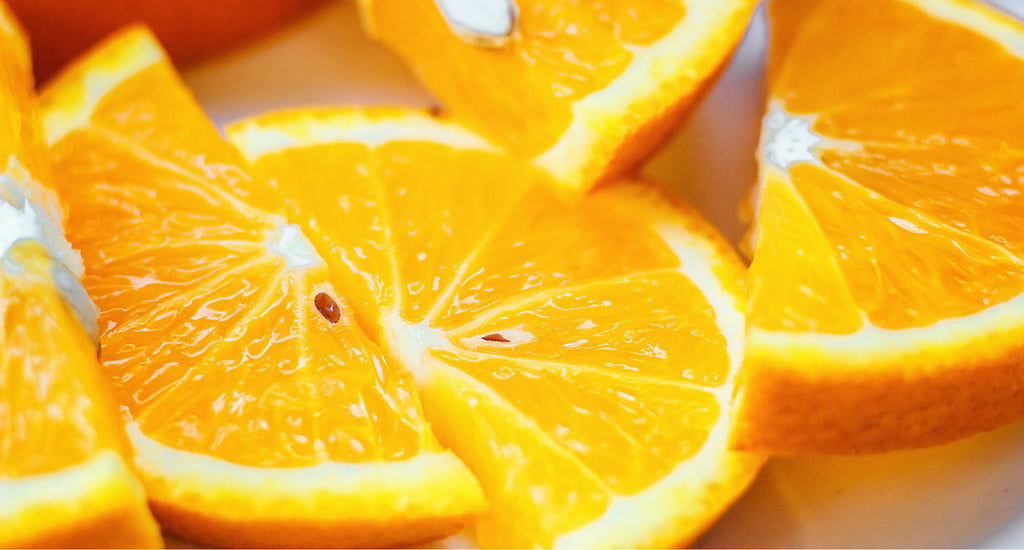
Does your dog need Vitamin C?
We know that Vitamin C is good for humans. But will Vitamin C keep your dog bright-eyed and bushy-tailed? Or could it actually be harmful?
Ice and a slice?

For humans, the benefits of taking Vitamin C are clear. We know that it helps to boost our immune system and that’s why many of us take Vitamin C supplements to ward off colds. We feel as though it’s doing us good when we drink a glass of orange juice, add a slice of lemon to our gin and tonic or squeeze fresh lime juice over a salad.
And it’s easy to assume that what’s good for us is also good for our four-pawed friends. But in this case, that may not always be true.
The benefits of Vitamin C
Vitamin C is an important nutrient for both dogs and humans.
When we convert food into energy, our bodies create free radicals which can damage our cells. Vitamin C is a powerful antioxidant that can help mop up these free radicals, thereby neutralising their harmful effects.
Vitamin C also supports the body’s immune system by protecting the integrity of cells and encouraging the production and function of white blood cells.
The risks of scurvy on the high seas
Interestingly, humans can’t create their own Vitamin C. And if we don’t get enough of this essential nutrient, within a few months we’re likely to suffer from scurvy. This can result in bleeding gums, loose teeth, bulging eyes and wounds that are slow to heal. In extreme circumstances, it causes death.
It’s estimated that two million sailors died of scurvy between 1500 and 1800, simply through a lack of Vitamin C. Captain Cook swore by malt and sauerkraut as cures for the disease, although they had no effect. It wasn’t until 1795 that the Royal Navy started to give sailors lemon or lime juice as a preventative measure, following an experiment by Scottish surgeon, James Lind.
Luckily, these days, scurvy is a pretty rare disease. Probably because even if you’re on a cruise for several months to the Antarctic, they’re likely to have the odd fruit and vegetable on board.
Dogs have the upper paw

When it comes to Vitamin C, though, dogs have the edge on humans. They can manufacture their own Vitamin C and don’t require an additional dietary source of the nutrient.
Most animals make their own Vitamin C. Those that can’t include humans, monkeys and apes, as well as bats, capybaras and guinea pigs.
In fact, if you give a dog a standalone Vitamin C supplement, it could do more harm than good. When your pup consumes more Vitamin C than they need, they will excrete it in the form of oxalate which can create calcium oxalate stones in the urinary tract.
Why does YuMOVE contain Vitamin C?
The eagle-eyed among you will have noticed that YuMOVE, our proven* joint supplement, contains Vitamin C. We include this nutrient as part of a balanced formulation because it helps to neutralise free radicals and maintain joint mobility. The amount of Vitamin C in YuMOVE is carefully calculated and is a safe dosage for dogs.
Looking after your dog’s wellbeing with Lintbells
At Lintbells, for over a decade, we’ve been creating supplements that are especially formulated to suit dogs’ requirements. Every supplement in our range is precisely tailored to support the needs of animals at different stages of their lives.
For example, in the YuMOVE range, we have YuMOVE Young and Active, for dogs with growing or active joints, YuMOVE Dog, for dogs with moderate joint stiffness, and YuMOVE Plus for older furry friends.
Give your furry best friend the best quality supplements
When you give your canine pal Lintbells, you can be sure that you’re giving them the very highest quality supplements, precisely tailored for their doggy needs.
And if you’d ever like to know more about how we choose or source our ingredients, or which supplement is right for your pup, do please get in touch by calling us on +44 (0)1462 416866 or emailing us at info@lintbells.com. We’d love to hear from you.
*Study conducted by the Royal Veterinary College


